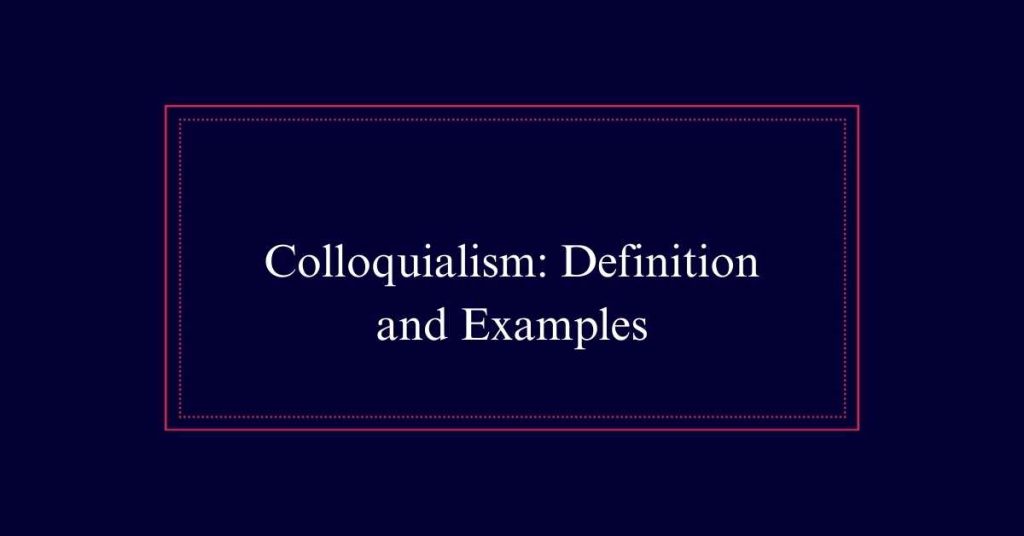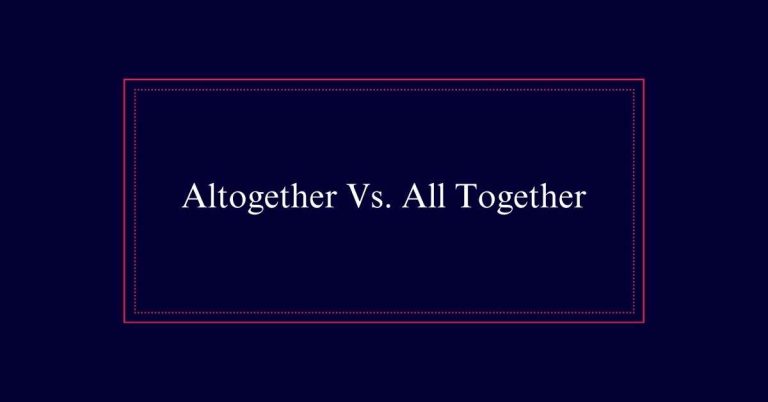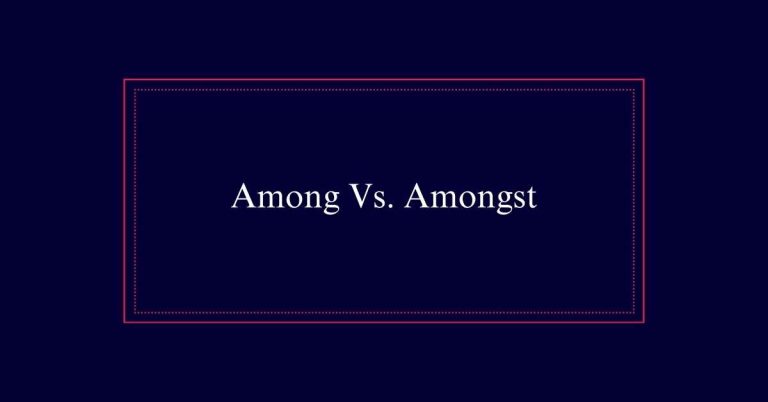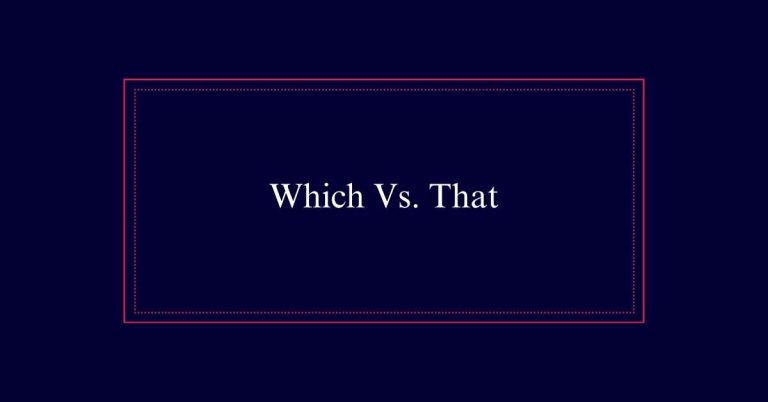Colloquialism: Definition and Examples
A colloquialism is an informal expression specific to a particular region or community. It reflects local culture and social norms, adding authenticity and relatability to conversation. Colloquialisms differ from slang, which evolves quickly and is used casually.
For instance, “ain’t” in American English or “knackered” in British English. Unlike jargon, which is specialized language for certain industries, colloquialisms are everyday phrases that convey familiarity. Regional variations enrich English by highlighting cultural diversity.
Definition of Colloquialism
A colloquialism is a word or phrase used in informal language and everyday conversation. It is typically specific to a particular region or community. Colloquialisms often reflect the culture, norms, and social practices of the area where they are used.
Unlike formal language, colloquialisms add a touch of realism and relatability to dialogue. They help convey a character’s background and can make narratives more engaging. Writers use colloquialisms to create authentic, believable settings and voices.
These expressions are dynamic and can evolve rapidly over time. They add depth to language and offer insight into local customs and traditions.
Colloquial Vs. Colloquialism
Understanding the distinction between ‘colloquial’ and ‘colloquialism’ is fundamental to appreciating their roles in language. ‘Colloquial’ is an adjective describing informal language used in everyday conversation. It reflects the casual tone and phrasing typical in non-formal settings.
In contrast, ‘colloquialism’ is a noun referring to specific informal expressions or phrases. These expressions often vary by region and are ingrained in local culture.
For example, saying ‘gonna’ instead of ‘going to’ is colloquial, while ‘gonna’ itself is a colloquialism. Recognizing this difference helps in understanding how language evolves in different contexts.
Pronunciation Guide
Correct pronunciation is essential for mastering both colloquial and colloquialism. Pronouncing these terms accurately guarantees clear communication and demonstrates a strong command of language nuances.
Below is a helpful table for pronunciation:
| Term | Pronunciation Guide |
|---|---|
| Colloquial | kuh-LOH-kwee-uhl |
| Colloquialism | kuh-LOH-kwee-uh-liz-um |
| Colloquial (IPA) | /kə-ˈloʊ-kwi-əl/ |
| Colloquialism (IPA) | /kə-ˈloʊ-kwi-ə-lɪz-əm/ |
| Colloquial (Phonetic) | kuh-LOH-kwee-uhl |
Usage in Conversation
In conversation, colloquialisms bring a relaxed and natural tone to the dialogue. They help people connect more easily by using familiar language.
Colloquialisms are often region-specific, reflecting local culture and norms. They can also make conversations more engaging and relatable.
Here are three key ways colloquialisms enhance conversation:
- Familiarity: They create a sense of belonging and shared understanding among speakers.
- Expressiveness: They add color and personality to speech, making it more vivid.
- Efficiency: They convey complex ideas quickly and intuitively.

Informal Vs. Formal Language
While colloquialisms enrich informal conversations, distinguishing between informal and formal language is critical for effective communication. Informal language is casual and conversational. It is often used among friends and family. Formal language, on the other hand, is precise and structured, suitable for professional and academic settings. Below is a comparison to highlight key differences:
| Aspect | Informal Language | Formal Language |
|---|---|---|
| Vocabulary | Simple, everyday words | Complex, precise words |
| Tone | Casual and friendly | Serious and respectful |
| Contractions | Frequently used | Rarely used |
| Grammar | Flexible, less strict | Strict, follows rules |
| Audience | Friends, family, peers | Professionals, academics |
Colloquialism in Literature
Colloquialisms in literature bring authenticity to characters’ dialogues and enhance the narrative’s regional flavor. They allow authors to create more believable characters, reflecting how people speak in real life. This adds depth to the story and connects readers to specific cultural or geographic settings.
Here are three ways colloquialisms benefit literature:
- Character Development: Colloquialisms reveal a character’s background and personality.
- Setting Enhancement: They provide subtle clues about the story’s location.
- Reader Engagement: Familiar, everyday language makes the text more relatable and immersive.
Colloquialisms Vs. Slang
Understanding the distinction between colloquialisms and slang is important for appreciating their unique roles in language. Colloquialisms are informal expressions used within a specific region. They add cultural flavor and are often found in everyday conversation. Slang, on the other hand, is more playful and innovative. It changes rapidly and is used by specific demographics, often younger people.
Here is a comparison:
| Aspect | Colloquialism | Slang |
|---|---|---|
| Usage | Regional | Demographic |
| Tone | Informal | Casual and playful |
| Stability | More stable over time | Rapidly evolving |
| Examples | “Ain’t” (American) | “Lit” (modern slang for exciting) |
| Purpose | Enhances cultural understanding | Adds modern, fresh flavor to language |
Colloquialism Vs. Jargon
Differentiating between colloquialism and jargon is essential for understanding their distinct roles in communication. Colloquialisms are informal expressions common to specific regions. They add local flavor and character to conversations and writing.
Jargon, on the other hand, consists of specialized terminology used within specific industries or professions. It serves to create precise and efficient communication among experts.
To clarify:
- Colloquialisms are region-specific and used in everyday speech.
- Jargon is industry-specific and used among professionals to convey complex ideas quickly.
- Purpose: Colloquialisms enhance local color, while jargon promotes clarity and precision within a field.
Regional Colloquialisms
While jargon serves specialized fields, regional colloquialisms bring local color to everyday speech. These expressions are unique to specific areas, adding richness to language. Colloquialisms differ by country, enhancing cultural understanding and making conversations more vivid. For instance, the word “boot” refers to the trunk of a car in British English, but in American English, it means footwear.
Here is a table highlighting some regional colloquialisms:
| Country | Colloquialism | Meaning |
|---|---|---|
| United States | Ballpark | An estimate |
| Australia | Deadset | Absolutely |
| United Kingdom | Knackered | Exhausted |
| Canada | Double-double | Coffee with double cream and sugar |
Examples of Colloquialisms
Let’s explore some examples of colloquialisms to understand how they add character to language.
Colloquialisms are informal expressions that reflect regional speech patterns. They can make dialogue more authentic and relatable. Here are some notable examples from different English-speaking countries:
- American English:
- *Ain’t*: A contraction for ‘am not‘ or ‘is not.
- *Ballpark*: An estimate or rough calculation.
- *Rain check*: A promise to reschedule an activity.
- British English:
- *Bloody*: An intensifier, often used for emphasis.
- *Knackered*: Extremely tired.
- *Rubbish*: Nonsense or something worthless.
- Australian English:
- *Deadset*: Absolutely or genuinely.
- *Flat out*: Very busy or working hard.
- *What’s the John Dory?*: What’s the story or what’s happening?






